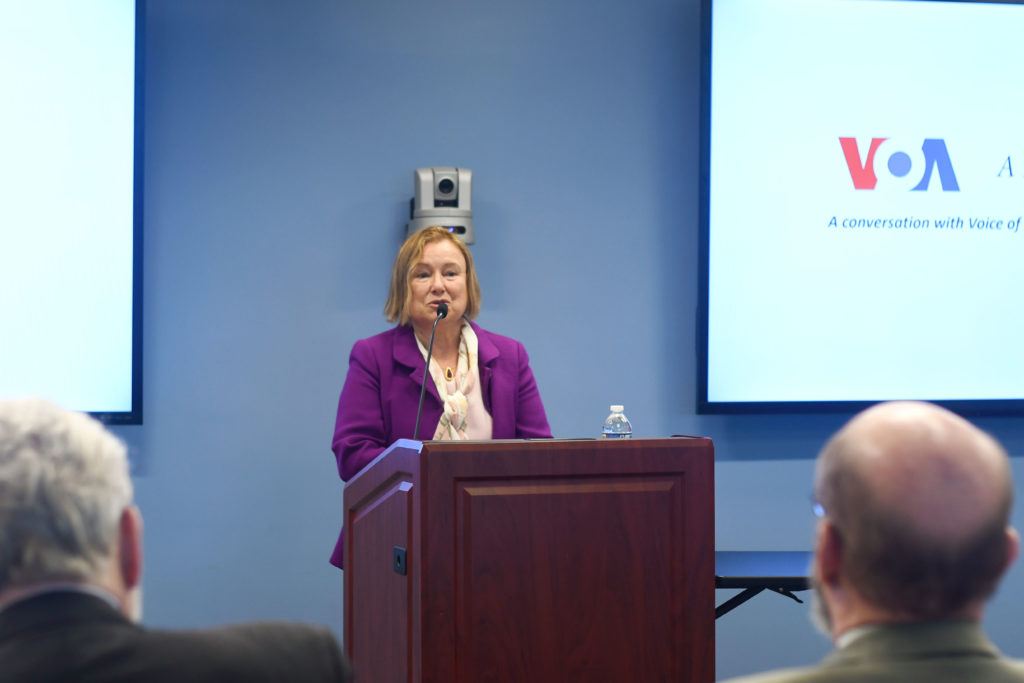The director of U.S. government-funded news organization Voice of America discussed VOA’s future and freedom of the press worldwide at the Elliott School of International Affairs Monday.
Amanda Bennett, who has headed VOA for three years, spoke about the news agency’s work to transmit information to countries with limited freedom of the press and the group’s new efforts with refugee camps. About 100 people attended the event, which was hosted by the Public Diplomacy Council, the Public Diplomacy Association of America and the University of Southern California’s Annenberg Center on Communication Leadership and Policy.
Bennett said VOA, which was founded during the Second World War and broadcasts news around the world in 46 languages, is a nonpartisan, unbiased source of news even though its funding comes from the U.S. government. She said VOA’s reputation rests on the separation between VOA and politicians, a quality that some state-run media outlets around the world do not share.
“We are independent of the U.S. government,” she said. “That underlies our credibility. Because as you know from other state-funded organizations, they do not enjoy that same credibility.”
Bennett said VOA’s high trustworthiness rating in countries like Afghanistan, where people may disapprove of the U.S. government and its ongoing military efforts in their country, is an indication that the group produces fair and respected news broadcasts. VOA’s worldwide credibility increased to 84 percent last fall, according to VOA’s website.
Bennett said VOA hopes to help reverse declining press freedom around the world by highlighting journalists and their impact worldwide. Global press freedom declined to its lowest point in 13 years in 2016, according to a 2017 report from Freedom House.
“We’re going to be covering free press in all its intricacies, with all of our journalists around the world,” Bennett said.
She said VOA reporters around the world face obstacles from government officials, like threats of violence and bans on airing VOA broadcasts, in countries without strong guarantees of freedom of the press.
“Much of the threats we still face are really of the old-fashioned variety,” Bennett said. “Harassment, intimidation of family members, tax issues, economic issues.”
She added that for several VOA journalists, harsh or bleak living conditions in the countries in which they are stationed post additional challenges to reporting the news.
“We have reporters in Venezuela right now who are reporting day in and day out of that country,” Bennett said. “We asked a group who came to visit us, ‘What’s the most difficult thing that they face right now?’ They said, ‘Getting water and getting food.’ Yet they continue to work.”
Bennett said VOA officials and journalists are now focusing on delivering fair and free information to refugee camps where access to global news is scarce. She said VOA has implemented two pilot projects in Kenya’s Kakuma refugee camp, which houses 165,000 refugees from Ethiopia, Sudan and Somalia, and in Bangladeshi camps for Rohingya people fleeing Myanmar, where they are persecuted.
Bennett said the people she spoke to at refugee camps were “desperate” for information about events around the world and in their home countries. She added that VOA officials have tentative plans to introduce VOA programming into every United Nations refugee camp.
Bennett said other interactions she had with refugees inspired her to expand VOA’s Learning English Program, which features daily broadcasts in English spoken at a slower pace to promote comprehension among English language learners, in 2014.
She said that last month, VOA further increased these efforts by introducing person-to-person contact between VOA volunteers and refugee children and adults aiming to learn English. The program has a force of English language instructors about 5,000 strong in the Rohingya camps, Bennett said.
She said the program will benefit children and adult refugees by teaching them to speak a language that makes them more attractive to employers worldwide.
“I tell the young people in Voice of America, ‘You’re going to be walking through a street someplace in Washington, New York, someplace in Southeast Asia, and a 25-year-old is going to come up to you and say, ‘I got out of the Rohingya camp and got a job in Indonesia or Thailand or Canada because you taught me English,’” Bennett said.





